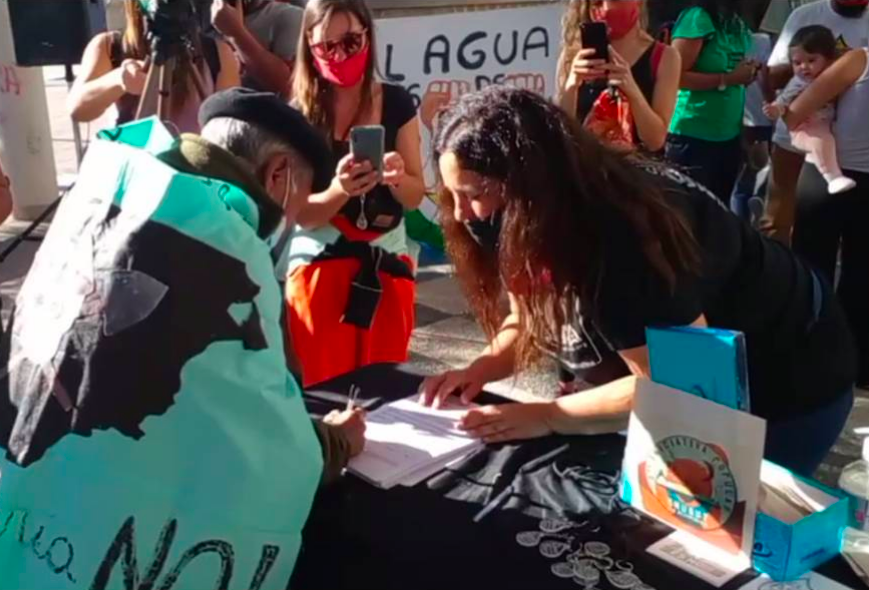On January 21, 2022, the Union of Community Assemblies of Chubut, Argentina (UACCh) launched its third popular initiative, "Chubut Sin Megaminería" ("No Megamining in Chubut"). The Assemblies are collecting signatures from residents in the province in an effort to present a bill which, if turned into law, could strengthen protections for water and the environment from the devastating impacts of industrial mining.
This campaign marks over 19 years of organized peaceful resistance by the Indigenous Mapuche-Tehuelche people and popular assemblies to protect the Patagonian region of Argentina where, despite broad opposition, Canadian mining investors such as Pan American Silver are making every attempt to advance mining projects. On December 16, the Vancouver-based company boasted that the provincial legislature of Chubut had approved a law to allow open-pit mining in certain areas, essentially giving the green light for the company to get to work on its $1 billion Navidad mine, and allow Yamana Gold’s Suyai project to advance.
Thousands of people immediately took to the streets throughout Chubut and across Argentina carrying placards reading "No es no" (No means no)" and “#FueraPanAmericanSilver (Pan American Silver Out)” to denounce the Canadian mining company’s efforts to push for the law. Pan American Silver was forced to retract its celebration when, on December 20, Chubut’s Governor Mariano Arcioni responded to this massive public outcry by repealing the law and announcing that he would call a referendum on mining.
But such a referendum lacks support. “We’re against holding a referendum because we’ve already held one in the streets. The community has spoken – and has been speaking for 19 years now against large scale mining in Chubut. This is why we’re going ahead with gathering signatures and support for the third popular initiative,” said Flavia Nuñez in an interview with MiningWatch Canada. Flavia is a member of the Asamblea en defensa del territorio de Puerto Madryn (Assembly in Defense of the Territory of Puerto Madryn), a member organization of the UACCh.
There was an outpouring of national and international support during the protests against the mining law – a law which many say was drafted for and by the mining companies. Thirty-four international organizations sent a letter of solidarity to the people of Chubut, denouncing police repression. As Amnesty International Argentina reported, "excessive use of force by security forces was used against protestors [and] 7 people were arrested and more than 30 injured." Communities also got support from a curious ally, Anonymous, who shut down Pan American Silver's site twice during the peaceful protests.
This latest popular legislative initiative by the Assemblies is in its third iteration. The second popular initiative collected over 30,000 signatures during one of the worst moments of the COVID-19 pandemic in May 2020. Now, the UACCh aims to collect 100,000 signatures.
The bill will be presented before the same legislature who initially approved and then repealed the law to rezone the province for mining, giving communities a cautious sense of optimism that the legislature may now respond to the will of the people in permanently banning mining. As Cristina Agüero, a member of No a la Mina Esquel (No to Mining in Esquel), another member organization of UAACh, told MiningWatch, “It’s not like this legislature is against large scale mining. But [given what happened in December] there may now be the political conditions to approve the bill this year, or at least take it under consideration…The legislature will once again be unable to ignore the broad support.”
Chubutenses are being galvanized by resistance to other extractive megaprojects in the country. They recall how two years ago, the governor of Mendoza was pressured by popular protests to revoke provincial legislation allowing for more mines in the province of Mendoza. They have also found synergy with recent massive mobilizations at the national level who are demanding that authorities repeal a decree passed in late December that allows for oil exploration in the Atlantic Ocean in the coastal city of Mar del Plata, protests widely known as the #Atlanticazo.
Details of the Third Popular Initiative:
The draft bill resubmits the same text as the second initiative and has as its central objective "[to guarantee] that the mining industry is compliant with principles to prevent environmental damage and that are also precautionary, sustainable and equitable across generations," to:
- guarantee the rational and sustainable use of natural resources;
- protect hydrological resources;
- maintain the equilibrium and dynamics of ecological systems;
- ensure biological conservation;
- prevent harmful or dangerous impacts that anthropogenic activities cause to the environment;
- enable sustainable, economic and social development;
- minimize environmental risk;
- prevent the possibility of environmental emergencies, and
- remediate the environmental harms that have been caused to date.
To accompany the launch of the third popular initiative, the Assemblies of the Communities of Chubut, Argentina (UACCh) released a joint statement. Read the English translation.
Photo credit: Radio Sudaca on Twitter.
